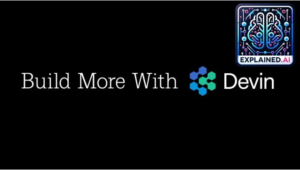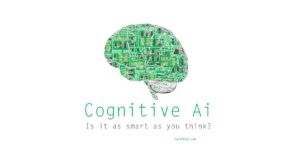Unveiling Devin AI, the world’s first autonomous software engineer! This blog dives into Devin’s capabilities, from writing code to tackling entire projects. Explore the potential impact of AI on software development, the future of human-AI collaboration, and the exciting road ahead.
INTRODUCTION
The world of Artificial Intelligence (AI) has witnessed remarkable advancements in recent years. From facial recognition to self-driving cars, AI is rapidly transforming various aspects of our lives. However, a recent development has caused a stir in the tech industry: Devin, the world’s first “fully autonomous” AI software engineer, created by US-based applied AI lab, Cognition.
Devin isn’t just another coding assistant. It’s a game-changer, capable of undertaking entire software development projects, from ideation to deployment. This raises a plethora of questions: What can Devin do? How does it work? And what are the implications for the future of software development?

Decoding Devin’s Capabilities
Devin boasts an impressive array of skills that would make any human software engineer envious. Here’s a breakdown of its core functionalities:
- Coding Expertise: Devin can write code in various programming languages, adhering to best practices and industry standards. It can also debug existing code and identify potential errors, ensuring smooth functionality.
- Problem-Solving Prowess: Faced with a software development challenge, Devin can analyze the problem, design solutions, and implement them through code. Its ability to learn and adapt continuously allows it to tackle complex projects.
- End-to-End Development: Unlike coding assistants that require human intervention, Devin can handle the entire development lifecycle. This includes writing code, testing functionalities, deploying the software, and even fixing bugs that arise post-deployment.
- Self-Learning and Improvement: Devin is constantly learning and evolving. It utilizes machine learning algorithms to analyze vast amounts of code data, improve its coding skills, and stay updated with the latest programming trends.
- Long-Term Reasoning and Planning: Devin can break down complex software projects into smaller, manageable tasks, plan the development roadmap, and execute them efficiently
The Inner Workings of Devin
Cognition remains tight-lipped about the specifics of Devin’s underlying technology. However, based on available information, it’s believed to function through a combination of:
- Large Language Models (LLMs): These advanced AI models allow Devin to understand natural language instructions, translate them into programming code, and generate human-quality code.
- Machine Learning Algorithms: Devin leverages machine learning to analyze code repositories, identify patterns and best practices, and continuously improve its coding abilities.
- Deep Learning Techniques: Deep learning algorithms could potentially be used by Devin for tasks like code optimization, vulnerability detection, and automated testing.
A New Era of Software Development?
Devin’s arrival marks a significant leap forward in the field of AI-powered software development. Here are some potential implications:
- Increased Efficiency: By automating repetitive coding tasks and handling entire development cycles, Devin can significantly accelerate software development processes.
- Reduced Costs: Companies might save resources by utilizing Devin for projects that were previously handled by human developers. This could lead to cost reductions and faster time-to-market for software products.
- Democratization of Development: Devin could potentially make software development more accessible, allowing individuals with less technical expertise to create basic software applications.
- Shifting Skillsets: The rise of AI engineers like Devin might necessitate a shift in the skillsets required by human software developers. Focus may move towards areas like project management, AI integration, and overseeing the work of AI engineers.
The Human Element: Collaboration or Competition?
While Devin’s capabilities are impressive, it’s important to remember that AI is still under development. Concerns remain about its ability to handle complex, creative problem-solving tasks that require human ingenuity. Additionally, ethical considerations regarding potential job displacement and the need for robust safety measures in AI-driven development need to be addressed.
Therefore, the future of software development is likely to involve a collaborative approach, with Devin working alongside human developers. Humans can leverage Devin’s efficiency and expertise for routine tasks, while focusing on higher-level aspects like strategic planning and creative problem-solving.
The Road Ahead
Devin’s emergence is a pivotal moment in the evolution of AI. It represents a significant step towards the democratization of software development and holds the potential to revolutionize the way software is built. However, ethical considerations and the need for human oversight remain crucial aspects of navigating this new landscape. As AI technology continues to advance, it will be fascinating to see how Devin, and its future iterations, shape the future of software development and the broader tech industry.






